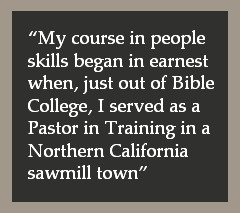Learning People Skills
 Republished, with permission, from Voice magazine, Mar/Apr 2013.
Republished, with permission, from Voice magazine, Mar/Apr 2013.
During the afternoon of an IFCA Regional Conference, several Regional leaders interviewed two young men who were preparing for ordination. Since I knew the young men and had recently been through that same process, I asked Dick how the interview went. Dick Schwab was a man twenty-five years my senior, a long-time IFCA member, and a member of the founding board of Northwest Independent Church Extension (NICE) with which I served. He loved details and ardently, but graciously, defended the faith. He chose his words carefully.
“I have observed,” he began in answer to my question, “That many more men fail in ministry for lack of people skills than for lack of theological training.”
I have long since forgotten the remainder of Dick’s comments in that conversation, but I often recall his assessment of the importance of people skills. Over a period of years I observed Dick defending his convictions about such often debated issues as cessationism, eschatology, and dispensationalism. I appreciated his scholarship as well as his commitment to the truth. It was his defense of those views without alienating those who disagreed, however, for which I most remember him.
 Republished, with permission, from
Republished, with permission, from 
Discussion